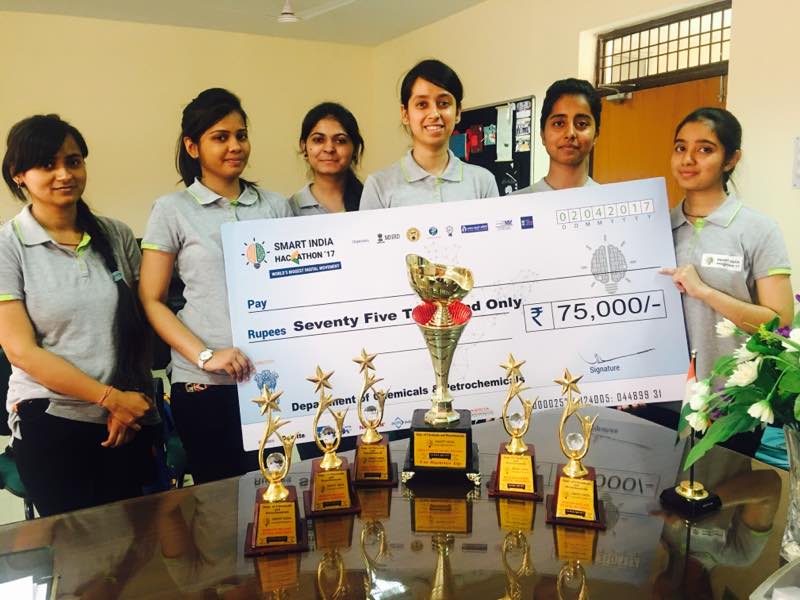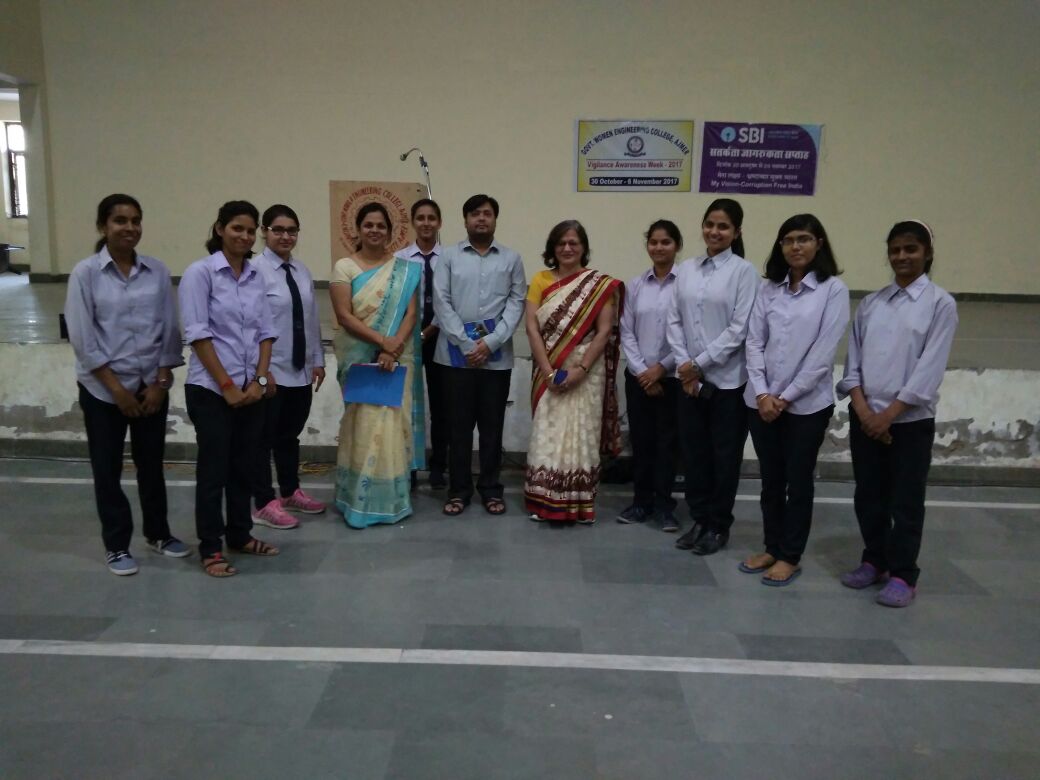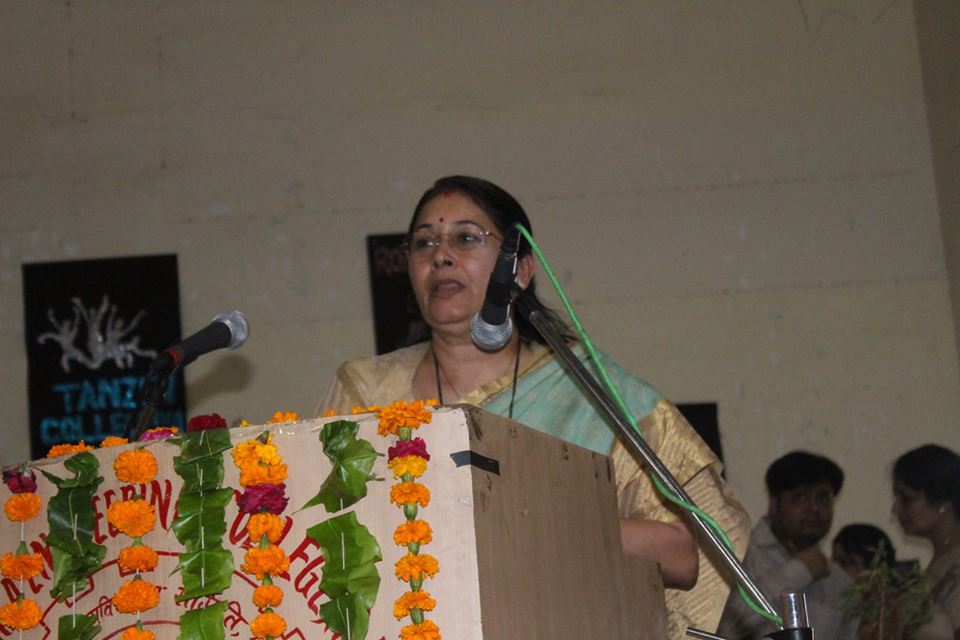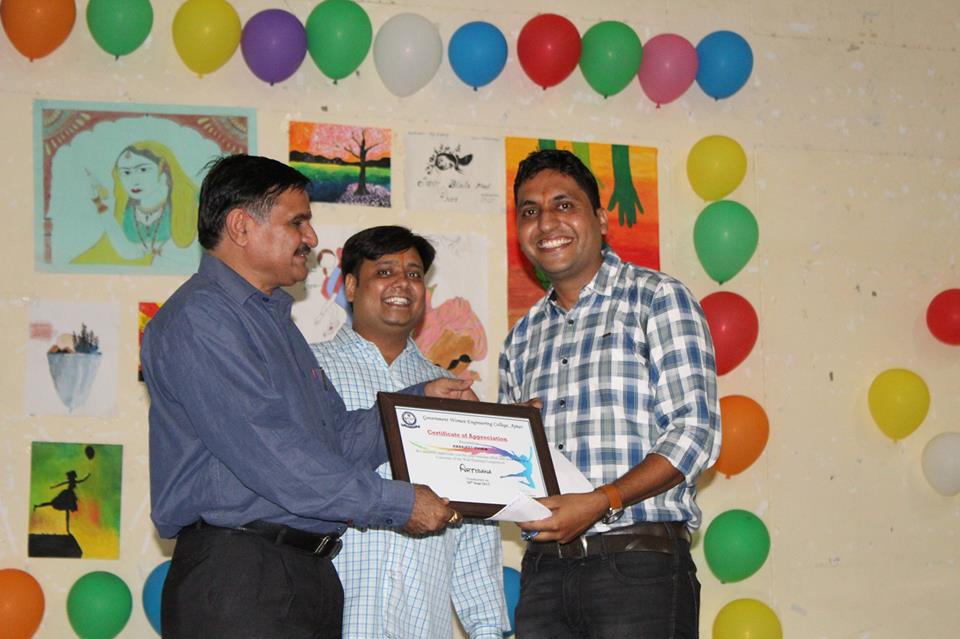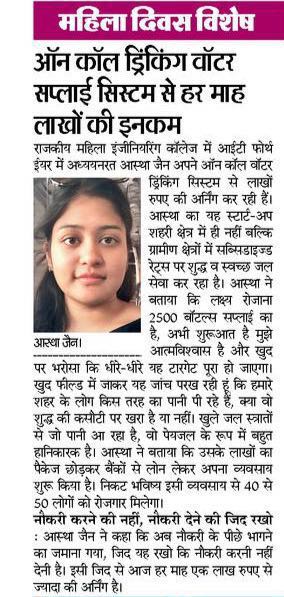Information Technology
Department of Information Technology
The department offers a four year undergraduate course in Information Technology leading to the award of Bachelor of Technology from Rajasthan Technical University. The program imparts an out standing education opportunity for those , planning to pursue a career or to gain in depth knowledge in Information Technology.
| S.No. | Degree | Specialization/Branch | Current Intake |
|---|---|---|---|
| 1 | B. Tech | Information Technology (IT) | 60 |
Vision of Department
- To produce quality human resource in computer science for empowerment of females.
Mission of Department
- To provide opportunities to the students for improving interpersonal skills and wholistic development, so they become professionally competitive and responsible citizen.
- To transfer fundamental knowledge on various subject areas and develop capability to analyses and solve new problems.
- To provide state of the art laboratory facilities and exposure to practical aspects of various computer engineering principles and inculcate ability to analyse, design, test and implement solutions to various problems in the field of computer engineering.
- To provide ample opportunities for training and placement.
Program Specific Outcome (PSOs):- Engineering Graduates will be able to:
- PSO1: Apply their knowledge and skills in using various software and hardware systems of information and communication technologies.
- PSO2: Create and invent IT solutions for real life problems.
- PSO3: Learn recent advancements in Information and communication Technology.
Program Educational Objectives (PEOs)
- PEO1: To prepare students to excel in Information Technology program through quality education enabling them to succeed in computing and IT industry profession.
- PEO2: To provide students with a solid foundation in mathematics, engineering, basic science fundamentals required to solve IT problems.
- PEO3: To expose students to tools and techniques of Information Technology so that they can comprehend, analyse, design and create innovative computing products and solutions for real life problems.
- PEO4: To inculcate in student’s multidisciplinary approach, professional attitude and ethics, communication and teamwork skills, and ability to relate IT and computer science issues with social awareness.
- PEO5: To imbibe such qualities in students which enable them to be successful entrepreneurs.
Program Outcomes (POs)
- Engineering knowledge: Apply the knowledge of mathematics, science, engineering fundamentals, and an engineering specialization to the solution of complex engineering problems.
- Problem analysis: Identify, formulate, review research literature, and analyze complex engineering problems reaching substantiated conclusions using first principles of mathematics, natural sciences, and engineering sciences.
- Design/development of solutions: Design solutions for complex engineering problems and design system components or processes that meet the specified needs with appropriate consideration for the public health and safety, and the cultural, societal, and environmental considerations.
- Conduct investigations of complex problems: Use research-based knowledge and research methods including design of experiments, analysis and interpretation of data, and synthesis of the information to provide valid conclusions.
- Modern tool usage: Create, select, and apply appropriate techniques, resources, and modern engineering and IT tools including prediction and modeling to complex engineering activities with an understanding of the limitations.
- The engineer and society: Apply reasoning informed by the contextual knowledge to assess societal, health, safety, legal and cultural issues and the consequent responsibilities relevant to the professional engineering practice.
- Environment and sustainability: Understand the impact of the professional engineering solutions in societal and environmental contexts, and demonstrate the knowledge of, and need for sustainable development.
- Ethics: Apply ethical principles and commit to professional ethics and responsibilities and norms of the engineering practice.
- Individual and team work: Function effectively as an individual, and as a member or leader in diverse teams, and in multidisciplinary settings.
- Communication: Communicate effectively on complex engineering activities with the engineering community and with society at large, such as, being able to comprehend and write effective reports and design documentation, make effective presentations, and give and receive clear instructions.
- Project management and finance: Demonstrate knowledge and understanding of the engineering and management principles and apply these to one’s own work, as a member and leader in a team, to manage projects and in multidisciplinary environments.
- Life-long learning: Recognize the need for, and have the preparation and ability to engage in independent and life-long learning in the broadest context of technological change.
Contact Information
Ms. Meeta Sharma
Head, Department of Information Technology(IT)
Mahila Engineering College Ajmer
Nasirabad Road, Makhupura, Ajmer-(305002)
Mobile No. : +91-9413059625
Email-ID : hodce@gweca.ac.in
Head of Department
| Qualification | Education Details | Designation |
|---|---|---|
| PhD (Pursuing),MTech,BTech | PhD (Pursuing)(Computer Science)Bikaner Technical University , MTech(VLSI Design)MNIT , BTech(CSE)Mody Institute of Technical Science | Asst.Professor |
| contact | ||
| 9413059625 | meetasharma@gweca.ac.in |
HOD Message
We welcome you to the department of Computer Engineering. Our Department thrives to produce the most promising female technocrats. The department with their coherent faculty members has produced hundreds of professionals and has established a name for itself in the country and abroad. We have consistently excelled in the highly competitive industrial environment. I attribute this success to the winning combination of a dedicated faculty that works hard at imparting quality education, a well-planned syllabus and last but not least, our students. Learning is a continuous process and does not end with the acquisition of a degree, especially because steady and rapid advances in computing technologies shorten the life of tools and techniques prevalent today. We do not aim to make our students walking manuals of any language or package. Instead, they are given a strong foundation in computer science and problem-solving techniques, and are made adaptable to changes. We strongly believe that this approach to teaching-learning, coupled with practical experience make our students prepare to handle the challenges posed by the software industry. Therefore I am confident that our students will be a worthy contribution to your organization.
Faculty Details
Mr. AMARJEET POONIA
| Qualification | Education Details | Designation |
|---|---|---|
| M. Tech. ,B. E. | M. Tech. (Information and communication)Gyan Vihar University , B. E.(Computer Science )Rajasthan University | Asst.Professor |
| Phone | ||
| amar@gweca.ac.in |
Ms. Bhawna Maurya
| Qualification | Education Details | Designation |
|---|---|---|
| M.Tech,B.E | M.Tech(CS)Banasthali University , B.E(CSE) University of Rajasthan | Asst.Professor |
| Phone | ||
| bhawnamaurya@gweca.ac.in |
Mr. Gaurav Gupta
| Qualification | Education Details | Designation |
|---|---|---|
| B.E.,M.Tech. | B.E.(Information Technology)University Of Rajasthan , M.Tech.(Computer Science Engineering)Rajasthan Technical University | Asst.Professor |
| Phone | ||
| gauravgupta@gweca.ac.in |
Mr. Gaurav Pathak
| Qualification | Education Details | Designation |
|---|---|---|
| B.E,M.Tech | B.E(Information Technology)RU , M.Tech(Computer Engineering)RTU | Asst.Professor |
| Phone | ||
| gauravpathak@gweca.ac.in |
Mr. Kuldeep Goswami
| Qualification | Education Details | Designation |
|---|---|---|
| M. Tech.,B.E.,GATE | M. Tech.(CSE)NIT Hamirpur , B.E.(IT)University of Rajasthan , GATE (IT)AIR 999 | Asst.Professor |
| Phone | ||
| hodit@gweca.ac.in kuldeep@gweca.ac.in |
Mr. Sudarshan Maurya
| Qualification | Education Details | Designation |
|---|---|---|
| B. E.,M. Tech. | B. E.(Information Technology)University of Rajasthan , M. Tech.(Computer Science & Engineering)IIT Delhi | Asst.Professor |
| Phone | ||
| sudarshanmaurya@gweca.ac.in |
Mr. Umesh kumar
| Qualification | Education Details | Designation |
|---|---|---|
| M.Tech,B.E,Diploma (3 years) | M.Tech(CSE)RTU , B.E(CSE)RU , Diploma (3 years)(ECE)BTER | Asst.Professor |
| Phone | ||
| umesh@gweca.ac.in |
Staff Details
| Qualification | Education Details | Designation |
|---|---|---|
| M.Sc(IT), MCA | M.Sc(IT), MCA | Programmer Cum System Administrator |
| Contact No | ||
| 9530252645 | balveer@gweca.ac.in |
| Qualification | Education Details | Designation |
|---|---|---|
| ITI Diploma in computer | ITI Diploma in computer | Technician |
| Phone | ||
| 9462039444 | bhupalsingh@gweca.ac.in
|
| Qualification | Education Details | Designation |
|---|---|---|
| M.Sc-IT,MCA | M.Sc-IT,MCA | Technician |
| Phone | ||
| 9887365919 | atulbhardwaj@gweca.ac.in |
| Qualification | Education Details | Designation |
|---|---|---|
| B.A,ITI | B.A,ITI | Technician |
| Phone | ||
| 8440010008 | preritgupta@gweca.ac.in
|
| Qualification | Education Details | Designation |
|---|---|---|
| M.A | M.A | Lab Attendant. |
| Phone | ||
| jitendraverma@gweca.ac.in |
| Qualification | Education Details | Designation |
|---|---|---|
| M.A | M.A | Lab Attendant. |
| Phone | ||
| satyanarayansharma@gweca.ac.in |
No Staff Assigned
Laboratory Details
Human Values Activity Lab
| Project Name | |
|---|---|
| Room No | |
| Incharge Name | |
| Technician Name | |
| Description | |
| Lab Description |
Computer Aided Machine Drawing Lab
| Project Name | |
|---|---|
| Room No | |
| Incharge Name | |
| Technician Name | |
| Description | |
| Lab Description |
Engineering Chemistry Lab
| Project Name | |
|---|---|
| Room No | |
| Incharge Name | |
| Technician Name | |
| Description | |
| Lab Description |
CP-II Lab
| Project Name | |
|---|---|
| Room No | |
| Incharge Name | |
| Technician Name | |
| Description | |
| Lab Description |
Advanced Web Programming Lab
| Project Name | |
|---|---|
| Room No | |
| Incharge Name | Gaurav Gupta |
| Technician Name | |
| Description | |
| Lab Description |
Digital Image Processing Lab
| Project Name | |
|---|---|
| Room No | |
| Incharge Name | |
| Technician Name | |
| Description | |
| Lab Description |
MAD Lab
| Project Name | |
|---|---|
| Room No | Param-A |
| Incharge Name | Gaurav Gupta |
| Technician Name | Atul Bhardwaj |
| Description | |
| Lab Description |
Software Testing Lab
| Project Name | |
|---|---|
| Room No | |
| Incharge Name | |
| Technician Name | |
| Description | |
| Lab Description |
DAA Lab
| Project Name | |
|---|---|
| Room No | PG computer Lab |
| Incharge Name | Kuldeep Goswami |
| Technician Name | |
| Description | |
| Lab Description |
GUI Design Lab
| Project Name | |
|---|---|
| Room No | Param - A |
| Incharge Name | Bhawna Maurya |
| Technician Name | Atul Bhardwaj |
| Description | |
| Lab Description |
Java Programming Lab
| Project Name | |
|---|---|
| Room No | Param-A |
| Incharge Name | Gaurav Gupta |
| Technician Name | Atul Bhardwaj |
| Description | |
| Lab Description |
CASE Lab
| Project Name | |
|---|---|
| Room No | Lab-H |
| Incharge Name | Bhawna Maurya |
| Technician Name | Prerit Gupta |
| Description | |
| Lab Description |
Research Details
Student Research Project
B.Tech Research Project
| Group Name | Project Title | Year |
|---|---|---|
| It | SuraKsha app | 2016 to 2017 |
M.Tech Research Project
| Group Name | Project Title | Year |
|---|---|---|
| Karuna Soni | New Gabor Wavelet Transform Feature Extraction Technique for Ear Biometric Recognition | 2014 |
| Sudhanshi Sharma | Performance Analysis of BPS Image Steganography in IWT | 2015 |
| Anita Yadav | Hybrid Invisible Image Watermarking in Frequency Domain | 2016 |
| Neha Gopaliya | New Hybrid Image Fusion Technique using IWT-DCT Transformation | 2017 |
| Rashmi | Cloud computing | 2017 |
Time Table
Department Notice
No Notice Published Yet.. !
Download
Home
Department of Information Technology
The department offers a four year undergraduate course in Information Technology leading to the award of Bachelor of Technology from Rajasthan Technical University. The program imparts an out standing education opportunity for those , planning to pursue a career or to gain in depth knowledge in Information Technology.
| S.No. | Degree | Specialization/Branch | Current Intake |
|---|---|---|---|
| 1 | B. Tech | Information Technology (IT) | 60 |
Vision of Department
- To produce quality human resource in computer science for empowerment of females.
Mission of Department
- To provide opportunities to the students for improving interpersonal skills and wholistic development, so they become professionally competitive and responsible citizen.
- To transfer fundamental knowledge on various subject areas and develop capability to analyses and solve new problems.
- To provide state of the art laboratory facilities and exposure to practical aspects of various computer engineering principles and inculcate ability to analyse, design, test and implement solutions to various problems in the field of computer engineering.
- To provide ample opportunities for training and placement.
Program Specific Outcome (PSOs):- Engineering Graduates will be able to:
- PSO1: Apply their knowledge and skills in using various software and hardware systems of information and communication technologies.
- PSO2: Create and invent IT solutions for real life problems.
- PSO3: Learn recent advancements in Information and communication Technology.
Program Educational Objectives (PEOs)
- PEO1: To prepare students to excel in Information Technology program through quality education enabling them to succeed in computing and IT industry profession.
- PEO2: To provide students with a solid foundation in mathematics, engineering, basic science fundamentals required to solve IT problems.
- PEO3: To expose students to tools and techniques of Information Technology so that they can comprehend, analyse, design and create innovative computing products and solutions for real life problems.
- PEO4: To inculcate in student’s multidisciplinary approach, professional attitude and ethics, communication and teamwork skills, and ability to relate IT and computer science issues with social awareness.
- PEO5: To imbibe such qualities in students which enable them to be successful entrepreneurs.
Program Outcomes (POs)
- Engineering knowledge: Apply the knowledge of mathematics, science, engineering fundamentals, and an engineering specialization to the solution of complex engineering problems.
- Problem analysis: Identify, formulate, review research literature, and analyze complex engineering problems reaching substantiated conclusions using first principles of mathematics, natural sciences, and engineering sciences.
- Design/development of solutions: Design solutions for complex engineering problems and design system components or processes that meet the specified needs with appropriate consideration for the public health and safety, and the cultural, societal, and environmental considerations.
- Conduct investigations of complex problems: Use research-based knowledge and research methods including design of experiments, analysis and interpretation of data, and synthesis of the information to provide valid conclusions.
- Modern tool usage: Create, select, and apply appropriate techniques, resources, and modern engineering and IT tools including prediction and modeling to complex engineering activities with an understanding of the limitations.
- The engineer and society: Apply reasoning informed by the contextual knowledge to assess societal, health, safety, legal and cultural issues and the consequent responsibilities relevant to the professional engineering practice.
- Environment and sustainability: Understand the impact of the professional engineering solutions in societal and environmental contexts, and demonstrate the knowledge of, and need for sustainable development.
- Ethics: Apply ethical principles and commit to professional ethics and responsibilities and norms of the engineering practice.
- Individual and team work: Function effectively as an individual, and as a member or leader in diverse teams, and in multidisciplinary settings.
- Communication: Communicate effectively on complex engineering activities with the engineering community and with society at large, such as, being able to comprehend and write effective reports and design documentation, make effective presentations, and give and receive clear instructions.
- Project management and finance: Demonstrate knowledge and understanding of the engineering and management principles and apply these to one’s own work, as a member and leader in a team, to manage projects and in multidisciplinary environments.
- Life-long learning: Recognize the need for, and have the preparation and ability to engage in independent and life-long learning in the broadest context of technological change.
Contact Information
Ms. Meeta Sharma
Head, Department of Computer Science & Engineering (CSE)
Mahila Engineering College Ajmer
Nasirabad Road, Makhupura, Ajmer-(305002)
Mobile No. : +91-9413059625
Email-ID : hodce@gweca.ac.in
HOD
Head of Department
Faculty
Faculty Details
Mr. AMARJEET POONIA
| Qualification | Education Details | Designation |
|---|---|---|
| M. Tech. ,B. E. | M. Tech. (Information and communication)Gyan Vihar University , B. E.(Computer Science )Rajasthan University | Asst.Professor |
| Phone | Mobile | |
| amar@gweca.ac.in |
Ms. Bhawna Maurya
| Qualification | Education Details | Designation |
|---|---|---|
| M.Tech,B.E | M.Tech(CS)Banasthali University , B.E(CSE) University of Rajasthan | Asst.Professor |
| Phone | Mobile | |
| bhawnamaurya@gweca.ac.in |
Mr. Gaurav Gupta
| Qualification | Education Details | Designation |
|---|---|---|
| B.E.,M.Tech. | B.E.(Information Technology)University Of Rajasthan , M.Tech.(Computer Science Engineering)Rajasthan Technical University | Asst.Professor |
| Phone | Mobile | |
| gauravgupta@gweca.ac.in |
Mr. Gaurav Pathak
| Qualification | Education Details | Designation |
|---|---|---|
| B.E,M.Tech | B.E(Information Technology)RU , M.Tech(Computer Engineering)RTU | Asst.Professor |
| Phone | Mobile | |
| gauravpathak@gweca.ac.in |
Mr. Kuldeep Goswami
| Qualification | Education Details | Designation |
|---|---|---|
| M. Tech.,B.E.,GATE | M. Tech.(CSE)NIT Hamirpur , B.E.(IT)University of Rajasthan , GATE (IT)AIR 999 | Asst.Professor |
| Phone | Mobile | |
| hodit@gweca.ac.in kuldeep@gweca.ac.in |
Mr. Sudarshan Maurya
| Qualification | Education Details | Designation |
|---|---|---|
| B. E.,M. Tech. | B. E.(Information Technology)University of Rajasthan , M. Tech.(Computer Science & Engineering)IIT Delhi | Asst.Professor |
| Phone | Mobile | |
| sudarshanmaurya@gweca.ac.in |
Mr. Umesh kumar
| Qualification | Education Details | Designation |
|---|---|---|
| M.Tech,B.E,Diploma (3 years) | M.Tech(CSE)RTU , B.E(CSE)RU , Diploma (3 years)(ECE)BTER | Asst.Professor |
| Phone | Mobile | |
| umesh@gweca.ac.in |
Staff
Staff Details
No Staff Assigned
Laboratory
Laboratory Details
Human Values Activity Lab
| Project Name | |
|---|---|
| Room No | |
| Incharge Name | |
| Technician Name | |
| Description | Lab Description |
Computer Aided Machine Drawing Lab
| Project Name | |
|---|---|
| Room No | |
| Incharge Name | |
| Technician Name | |
| Description | Lab Description |
Engineering Chemistry Lab
| Project Name | |
|---|---|
| Room No | |
| Incharge Name | |
| Technician Name | |
| Description | Lab Description |
CP-II Lab
| Project Name | |
|---|---|
| Room No | |
| Incharge Name | |
| Technician Name | |
| Description | Lab Description |
Advanced Web Programming Lab
| Project Name | |
|---|---|
| Room No | |
| Incharge Name | Gaurav Gupta |
| Technician Name | |
| Description | Lab Description |
Digital Image Processing Lab
| Project Name | |
|---|---|
| Room No | |
| Incharge Name | |
| Technician Name | |
| Description | Lab Description |
MAD Lab
| Project Name | |
|---|---|
| Room No | Param-A |
| Incharge Name | Gaurav Gupta |
| Technician Name | Atul Bhardwaj |
| Description | Lab Description |
Software Testing Lab
| Project Name | |
|---|---|
| Room No | |
| Incharge Name | |
| Technician Name | |
| Description | Lab Description |
DAA Lab
| Project Name | |
|---|---|
| Room No | PG computer Lab |
| Incharge Name | Kuldeep Goswami |
| Technician Name | |
| Description | Lab Description |
GUI Design Lab
| Project Name | |
|---|---|
| Room No | Param - A |
| Incharge Name | Bhawna Maurya |
| Technician Name | Atul Bhardwaj |
| Description | Lab Description |
Java Programming Lab
| Project Name | |
|---|---|
| Room No | Param-A |
| Incharge Name | Gaurav Gupta |
| Technician Name | Atul Bhardwaj |
| Description | Lab Description |
CASE Lab
| Project Name | |
|---|---|
| Room No | Lab-H |
| Incharge Name | Bhawna Maurya |
| Technician Name | Prerit Gupta |
| Description | Lab Description |
Research Details
Research Details
Student Research Project
B.Tech Research Project
| Group Name | Project Title | Year |
|---|---|---|
| It | SuraKsha app | 2016 to 2017 |
M.Tech Research Project
| Group Name | Project Title | Year |
|---|---|---|
| Karuna Soni | New Gabor Wavelet Transform Feature Extraction Technique for Ear Biometric Recognition | 2014 |
| Sudhanshi Sharma | Performance Analysis of BPS Image Steganography in IWT | 2015 |
| Anita Yadav | Hybrid Invisible Image Watermarking in Frequency Domain | 2016 |
| Neha Gopaliya | New Hybrid Image Fusion Technique using IWT-DCT Transformation | 2017 |
| Rashmi | Cloud computing | 2017 |
Time Table
Time Table
Department Notice
Department Notice
No Notice Published Yet.. !
